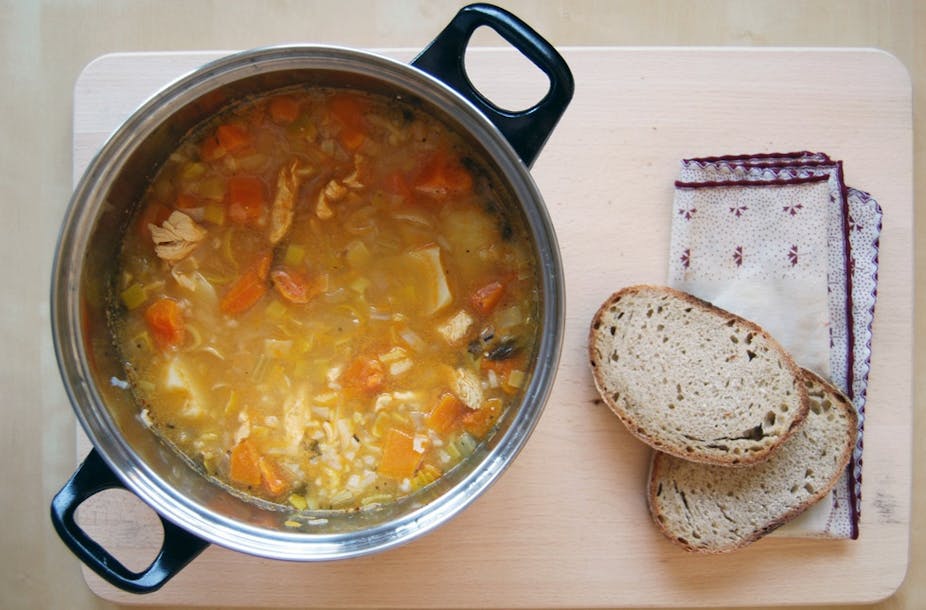Of all the homemade winter cure-alls, chicken soup is the best known and most loved. In fact the term “chicken soup” has become idiomatic for all things restorative; benefiting every possible problem from the head to the soul.
In many different cultures, chicken soup is a traditional treatment for symptoms of the common cold.
Chicken soup is widely known as “Jewish Penicillin”. In the 12th century, the Rambam, Rabbi Moses Maimonides published, in his “Medical Responsa”, the many health benefits of chicken soup for a range of ailments from pneumonia to a runny nose.
Some of this may reflect the traditional use of chicken soup as a Sabbath meal and the perceived importance of piety in affecting health outcomes.
Nonetheless, it’s a staple among Jewish grandmothers and their snotty grandchildren, worldwide.
Even before the Olympics, Greek grandmothers may also claim they invented Chicken soup for the common cold.
Avgolemono (Αυγολέμονο) is a thick egg and lemon (chicken) broth widely administered for the symptoms of cold and flu, or for their prophylaxis on wet winter evenings.
Although a quintessentially Greek dish, it is likely that its therapeutic use has its earliest origin in Sephardic tradition. Adding the “all important” lemon may have been the Greek contribution.
Not to be outdone, most Chinese grandmothers are ready and primed to produce chicken soup at the first sign of a sniffle.
In traditional Chinese medicine, illness is perceived as a state of imbalance between yin and yang. Yin represents the darker cooling forces, while yang embodies the lighter, warmer forces.
In this paradigm, the treatment for cold is obviously yang, and chicken soup is a prime example: restoring the yang forces and balancing the cold of yin.
There have been a few attempts to definitively establish these cold-busting effects in clinical studies
One study found that sipping hot chicken soup increased the velocity of nasal secretions (runny noses) in healthy volunteers. This could be a good thing for clearing a blocked nose but the study showed it only worked for a few minutes and wasn’t any more effective than hot water.
So far, studies haven’t tested whether chicken soup is really effective in fighting the common cold. And they haven’t compared the effectiveness of chicken soup against proven cold-fighting medicines such as analgesics and decongestants.
This does not mean it doesn’t work. Just that there is no reliable evidence. Despite this, the legendary status of chicken soup provoked a number of attempts for rational explanations.
These include the effect of heat/steam, rehydration and easy feeding when the throat is raw and the appetite is poor. This goes along the same line as the “the feed a cold, starve a fever” hypothesis.
Certainly, malnutrition impairs the immune system, and feeding can stimulate and enhance immune responses to viruses. But why is chicken soup a better choice?
Clinical trials using zinc lozenges show they can modestly reduce the duration and severity of cold symptoms if taken within 24 hours of the onset of the cold and in doses of more than 50 mg a day.
Some have argued that chicken soup is beneficial because it is naturally high in zinc, especially the bones and carcass that are used to make the broth. But most soup will contain less than 5mg a serve. And if zinc was the trick, oysters (at 100 mg of zinc each) should be a better option.
More recent studies have suggested carnosine, a natural antioxidant that is found exclusively in meat including chicken, may provide another explanation. But it is broken down so rapidly once ingested that little, if any, would reach the nose to provide relief.
Psychological stress is a risk factor for infectious diseases, including the common cold. The effect of “comfort foods” on stress and mood are real and powerful in some people, but not in others.
Moreover, any effects are usually transient. Chicken soup is hardly an effective way to manage stress and its effects in the long term.
But the real psychology of chicken soup can’t be overlooked: the expectation of efficacy, the succour of being cared for, the stimulation of taste on an otherwise dull day.
In traditional cooking, chicken soup is the flavour of home. It may not work, but does that really matter?

